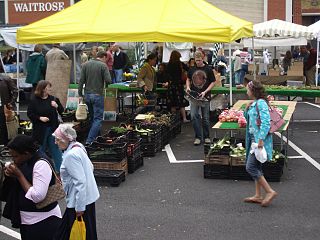
Permaculture is a set of design principles centered on whole systems thinking, simulating, or directly utilizing the patterns and resilient features observed in natural ecosystems. It uses these principles in a growing number of fields from regenerative agriculture, rewilding, and community resilience.

Intensive agriculture, also known as intensive farming, is a type of agriculture, both of crop plants and of animals, with higher levels of input and output per cubic unit of agricultural land area. It is characterized by a low fallow ratio, higher use of inputs such as capital and labour, and higher crop yields per cubic unit land area.

Local food is food that is produced within a short distance of where it is consumed, often accompanied by a social structure and supply chain different from the large-scale supermarket system.
Sustainable living describes a lifestyle that attempts to reduce an individual's or society's use of the Earth's natural resources, and one's personal resources. It is often called as "earth harmony living" or "net zero living". Its practitioners often attempt to reduce their ecological footprint by altering their methods of transportation, energy consumption, and/or diet. Its proponents aim to conduct their lives in ways that are consistent with sustainability, naturally balanced, and respectful of humanity's symbiotic relationship with the Earth's natural ecology. The practice and general philosophy of ecological living closely follows the overall principles of sustainable development.

Community-supported agriculture is a system that connects the producer and consumers within the food system more closely by allowing the consumer to subscribe to the harvest of a certain farm or group of farms. It is an alternative socioeconomic model of agriculture and food distribution that allows the producer and consumer to share the risks of farming. The model is a subcategory of civic agriculture that has an overarching goal of strengthening a sense of community through local markets.

Food First, also known as the Institute for Food and Development Policy, is a nonprofit organization based in Oakland, California, USA. Founded in 1975 by Frances Moore Lappé and Joseph Collins, it describes itself as a "people's think tank and education-for-action center".

Urban agriculture,urban farming, or urban gardening is the practice of cultivating, processing and distributing food in or around urban areas. Urban agriculture can also involve animal husbandry, aquaculture, agroforestry, urban beekeeping, and horticulture. These activities occur in peri-urban areas as well, and peri-urban agriculture may have different characteristics.

A market garden is the relatively small-scale production of fruits, vegetables and flowers as cash crops, frequently sold directly to consumers and restaurants. The diversity of crops grown on a small area of land, typically from under one acre to a few acres, or sometimes in greenhouses distinguishes it from other types of farming. Such a farm on a larger scale is sometimes called a truck farm.

Small-scale agriculture has been practiced ever since the Neolithic Revolution. More recently it is an alternative to factory farming or more broadly, intensive agriculture or unsustainable farming methods that are prevalent in primarily first world countries. Environmental Health Perspectives has noted that "Sustainable agriculture is not merely a package of prescribed methods. More important, it is a change in mind set whereby agriculture acknowledges its dependence on a finite natural resource base--including the finite quality of fossil fuel energy that is now a critical component of conventional farming systems."

The food industry is a complex, global collective of diverse businesses that supplies most of the food consumed by the world's population. Only subsistence farmers, those who survive on what they grow, and hunter-gatherers can be considered outside the scope of the modern food industry.

Organopónicos or organoponics is a system of urban agriculture using organic gardens. It originated in Cuba and is still mostly focused there. It often consists of low-level concrete walls filled with organic matter and soil, with lines of drip irrigation laid on the surface of the growing media. Organopónicos is a labour-intensive form of local agriculture.

The Meatrix is a short flash animation critical of factory farming and industrial agricultural practices. It has been translated into more than 30 languages and watched by more than 30 million people. It was made by the green messaging firm Free Range Studios in 2003 as a commissioned project for GRACE Communications Foundation, and two sequels were released in 2006, titled The Meatrix II: Revolting, and The Meatrix II ½.

The Omnivore's Dilemma: A Natural History of Four Meals is a nonfiction book written by American author Michael Pollan published in 2006. In the book, Pollan asks the seemingly straightforward question of what we should have for dinner. As omnivores, the most unselective eaters, humans are faced with a wide variety of food choices, resulting in a dilemma. Pollan suggests that, prior to modern food preservation and transportation technologies, this particular dilemma was resolved primarily through cultural influences.
Civic Agriculture is the trend towards locally based agriculture and food production that is tightly linked to a community's social and economic development. It is also connected to the citizenship and environmentalism within a community. Civic agriculture is geared towards meeting consumer demands in addition to boosting the local economy in the process through jobs, farm to food production efforts, and community sustainability. The term was first coined by Thomas Lyson, professor of Sociology at Cornell, to represent an alternative means of sustainability for rural agricultural communities in the era of industrialized agriculture. Civic agriculture is geared towards fostering a self sustainable local economy through an integral community structure in which the entire community is in some part responsible for their food production. Civic agriculture can provide a variety of benefits to a community such as cleaner water, fresher foods, and a better connection between farmers and the community. However, there are also critiques that are concerned with the way in which civic agriculture promotes community responsibility and possibly creates a false sense of citizenship. The intent of civic agricultural practices is to move away from the industrialized sector and into a localized community effort.
Sustainable food systems (SFS) are food systems that provide healthy food to people while also providing sustainable impacts on both environmental, economic and social systems that surround food. Sustainable food systems start with the development of sustainable agricultural practices, development of more sustainable food distribution systems, creation of sustainable diets and reduction of food waste throughout the system. Sustainable food systems are central to all 17 Sustainable Development Goals.
The term food system is used frequently in discussions about nutrition, food, health, community economic development and agriculture. A food system includes all processes and infrastructure involved in feeding a population: growing, harvesting, processing, packaging, transporting, marketing, consumption, and disposal of food and food-related items. It also includes the inputs needed and outputs generated at each of these steps. A food system operates within and is influenced by social, political, economic and environmental contexts. It also requires human resources that provide labor, research and education. Food systems are either conventional or alternative according to their model of food lifespan from origin to plate.

Agroecology is an applied science that involves the adaptation of ecological concepts to the structure, performance, and management of sustainable agroecosystems. In Latin America, agroecological practices have a long history and vary between regions but share three main approaches or levels: plot scale, farm scale, and food system scale. Agroecology in Latin American countries can be used as a tool for providing both ecological, economic, and social benefits to the communities that practice it, as well as maintaining high biodiversity and providing refuges for flora and fauna in these countries. Due to its broad scope and versatility, it is often referred to as "a science, a movement, a practice."

Farm-to-table is a social movement which promotes serving local food at restaurants and school cafeterias, preferably through direct acquisition from the producer. This might be accomplished by a direct sales relationship, a community-supported agriculture arrangement, a farmer's market, a local distributor or by the restaurant or school raising its own food. Farm-to-table often incorporates a form of food traceability where the origin of the food is identified to consumers. Often restaurants cannot source all the food they need for dishes locally, so only some dishes or only some ingredients are labelled as local.
A foodshed is the geographic region that produces the food for a particular population. The term is used to describe a region of food flows, from the area where it is produced, to the place where it is consumed, including: the land it grows on, the route it travels, the markets it passes through, and the tables it ends up on. "Foodshed" is described as a "socio-geographic space: human activity embedded in the natural integument of a particular place." A foodshed is analogous to a watershed in that foodsheds outline the flow of food feeding a particular population, whereas watersheds outline the flow of water draining to a particular location. Through drawing from the conceptual ideas of the watershed, foodsheds are perceived as hybrid social and natural constructs.

Farmageddon: The True Cost of Cheap Meat is a 2014 non-fiction book by Philip Lymbery and Isabel Oakeshott. It surveys the effects of industrial livestock production and industrial fish farming around the world. The book is the result of Lymbery's investigations for which he travelled the world over three years. Isabel Oakeshott is the political editor of The Sunday Times, Philip Lymbery is CEO of Compassion in World Farming. The book was published by Bloomsbury.













